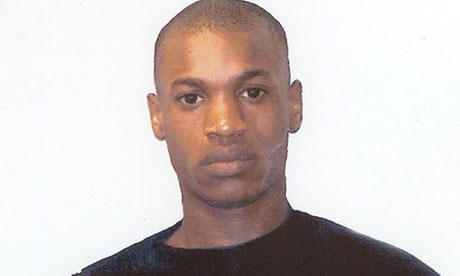
Prisoner's 16-year fight to prise open the secrets of Operation Cactus
Kevin Lane believes he was set up for murder by a bent detective and a criminal – and that people want him silenced, permanently
The story of Operation Cactus is still unfolding after 18 years, and in some respects it is a murder inquiry that can best be encapsulated by reference to a series of significant dates and numbers.
Robert Magill was murdered near his home in Chorleywood, Hertfordshire, on 13 October 1994, as he was walking his dog, Oscar. In 1996,
Kevin Lane was convicted of shooting him in what was seen as a contract killing, and for 16 years he has been protesting his innocence.
In that time, Lane has written more than 5,000 letters and had six lawyers.
Supporters have set up a website and raised more than £100,000 to help him conduct a miscarriage of justice campaign that is heavily focused on one man: a bent copper. Eight years ago, a detective in the Magill murder inquiry, Detective Sergeant Chris Spackman, was jailed for four years after a trial that exposed him as deeply corrupt and raised questions about his conduct in other investigations.
Lane believes he is close to being able to show he was implicated as the result of an inappropriate relationship between Spackman and a known criminal, Roger Vincent. None of this could have been known to the Old Bailey jurors when Lane was sent down all those years ago, but it may all undermine the safety of the decision they made. That is Lane's contention, and the 44-year-old may soon prise open the files of Operation Cactus.
It is often said the wheels of justice turn slowly, but in some cases, they hardly seem to turn at all. The details get murkier and more confusing with every disclosure, but Lane's predicament is all too familiar to any prisoner attempting to challenge a conviction.
Lane has had to turn detective and lawyer to keep his case from disappearing completely. With a secondhand laptop on his knees, he has been working on legal challenges for 40 hours a week during all the time he has been inside.
Judges had hoped the CCRC would have finished its work this January, and when that deadline was missed, by the end of April. The CCRC is still looking at the files. A spokesman said its investigation would be completed "sooner rather than later but it is not possible to put an exact date on it".
Lane has criticisms of the CCRC, but the body set up to look at cases like his has it own problems, which go far beyond its investigation into any individual. During the time Lane has been in jail, since early 1995, the prison population has increased by about 75% to 86,000. Meanwhile, the budget for the CCRC has been cut.
Its
annual report for 2011 said: "Our budget has been reduced over the past six years by nearly 30% or £2.6m in real terms. We put on hold plans to recruit new commissioners, we made a round of redundancies and anticipated further, voluntary, redundancies; we implemented strict spending controls and reviewed all areas of expenditure." Over the past three years, the CCRC's funding has shrunk from £6.51m to £5.2m.
Though the CCRC says it does not believe this has compromised its inquiries into Lane's case, Lane himself is not convinced it has the capacity for an investigation as complex, and potentially sensitive, as his.
Little by little, Lane and his current solicitor, Maslen Merchant, have uncovered details about the original murder inquiry which suggest, they say, that Lane was the victim of a set-up.
At the heart of this allegation is the Hertfordshire detective jailed in 2003 for what the judge called "a disgraceful catalogue of
crime and lies". Spackman was caught plotting to steal £160,000 from his own force, and had been siphoning off money to spend on a younger woman he was trying to impress.
This man was the officer in charge of disclosure evidence during the Magill inquiry, and he also questioned or had contact with other suspects and informers. One of the suspects was Vincent.
In the early days of the investigation Vincent and his friend David Smith were named as Magill's murderers in 20 separate tip-offs. They were both questioned, and Vincent was charged alongside Lane.
Official records, which were not disclosed to Lane or his lawyers at the time, show that Spackman met Vincent at least once before the trial, without anyone else present, for an informal chat. According to Spackman's note of the meeting, Vincent was trying to cut a deal. Vincent had denied involvement in the killing, but he told
police he knew who had ordered the "hit" and how much the killers had been paid.
In return for this evidence, Vincent wanted the charges against him dropped. That did not happen, but it was unnecessary in any case. During the trial, the case against Vincent was abandoned, with the prosecution admitting his alibi had not been properly investigated.
After his release from custody, records show Spackman went to Vincent's mother's home twice. Lane's belief is that Vincent and Spackman were in cahoots, and that the detective engineered the direction of the investigation in a way that put Lane in the dock. At the moment, this remains a conspiracy theory, but there is circumstantial evidence suggesting Lane's fears need to be more fully explored.
In 2005, Vincent and Smith, the pair originally named by informers as Magill's killers, were convicted of a shooting that was remarkably similar. Using an AK-47 assault rifle, they murdered a man called David King as he left a gym in Hoddesdon, Hertfordshire. The judge described it as a "thoroughly planned, ruthless and brutally executed assassination" – and jailed them for 30 and 25 years at Luton crown court.
Last year credence was lent to Lane's claim that he was set up when his lawyer was sent bundles of documents that appeared to be confidential police files. Within them were copies of apparently secret police memos. Merchant says the files, if genuine, show Lane was the victim of a deliberate and blatant plot.
After his conviction, stories appeared in the tabloids saying Lane was a contract killer who detectives called "the executioner".
The appeal court has asked the CCRC to establish whether the documents are real, and also to find the black bin-liner that was the crucial evidence against Lane at his trial. The bag was found in the boot of the car used by Magill's killers, and it had Lane's palm print on it. Lane has never denied driving the car: he had borrowed it a week before the murder and his son's fingerprints were also found on the vehicle.
But nobody seems to know where the bin-liner is now. "We have spent years asking about its whereabouts," said Merchant. "We still don't know."
In among all the fragments of new evidence and the coincidences, and within documents that they believe are being withheld, Lane believes the truth about Magill's murder can be found. He insists he will not admit to a crime he did not commit, even though that may affect his chances of getting out now he is approaching the end of the minimum 18-year prison term set by the court.
"I believe there is enough new information to affect the safety of the conviction," said Merchant. "If jurors back then had known what we know now, it is hard to imagine they could have found Kevin guilty.
"The evidence about the meeting between Spackman and Vincent was not disclosed at the time of the trial. If it had been, Kevin could have raised questions about whether the two men had an improper relationship, and whether they had acted together to find a scapegoat.
"He could have launched a positive defence. Every time we find out something new, lo and behold, Spackman is in the middle of it."
Merchant says Lane's determination to see this through has not dimmed, despite the setbacks, and the difficulties of trying to run a campaign from inside jail. Lane acknowledges he is in some danger now. With the appeal court now involved, and the CCRC under pressure to deliver, the case is finally coming to a head.
He has told the Guardian that there are people inside jail who are trying to shut him up – permanently. But he won't be deterred.
"Kevin is a very strong character," said Merchant. "He can't address his offending behaviour because he won't admit to the offence. If the governor of a prison told him, 'Here, sign this piece of paper, admit you did it, and you'll be out,' Kevin wouldn't do it. He will not do it."
In 2009 Duncan Campbell's reported on the compelling reasons to reopen the case of Kevin Lane.




